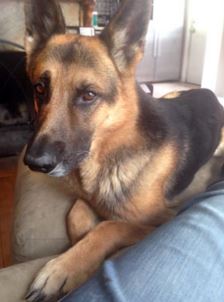-
Adopt
-
Veterinary Care
Services
Client Information
- What to Expect – Angell Boston
- Client Rights and Responsibilities
- Payments / Financial Assistance
- Pharmacy
- Client Policies
- Our Doctors
- Grief Support / Counseling
- Directions and Parking
- Helpful “How-to” Pet Care
Online Payments
Referrals
- Referral Forms/Contact
- Direct Connect
- Referring Veterinarian Portal
- Clinical Articles
- Partners in Care Newsletter
CE, Internships & Alumni Info
CE Seminar Schedule
Emergency: Boston
Emergency: Waltham
Poison Control Hotline
-
Programs & Resources
- Careers
-
Donate Now
Kaiser’s Story
“After we adopted Kaiser in 2008, we noticed that his food would come back up soon after he finished eating. Many vets and hours of research later, we had a confirmed diagnosis of Canine Megaesophagus (ME). Kaiser wasn’t throwing up his food, he was regurgitating; his food never made it to his stomach at all.
In December of 2011, we met Dr. Shawn Kearns at Angell Animal Medical Center. Dr. Kearns helped us understand ME and offered treatment advice that we hadn’t heard before. We chose her to become Kaiser’s Internal Medicine Specialist, and we are so glad that we did!

Just look at this handsome face!
In May of 2012, Kaiser was acting lethargic. We rushed him to a local vet, who recommended getting him to Angell’s ER as quickly as possible. An X-ray showed a terrible case of aspiration pneumonia (AP) and a foreign object lodged in his esophagus. Dr. Kearns was scheduled to perform the surgery, but since she was familiar with his ME, she recommended waiting until the following day to see if the foreign body passed. It did! We did not have to put him through the risk of surgery. Though he didn’t need surgery, Kaiser was admitted to the hospital for his AP and spent 4 days at Angell, making a complete recovery. The staff at Angell saved Kaiser’s life, and we are forever grateful. We continue to see Dr. Kearns and the staff. Their care and treatment of our dogs has been fantastic, and they are helping us keep them happy and healthy for a long, long time!” – Laurie Delpina
More on Megaesophagus
Megaesophagus (ME) can be described as having a “floppy” esophagus. The esophagus, a tube which connects the mouth to the stomach, is responsible for moving food to the stomach using involuntary wave-like contractions (just like in humans). When a dog has ME, his esophagus loses muscle tone, becomes enlarged, and develops pockets where the food becomes trapped. The food never makes it to the stomach. This can cause malnutrition and regurgitation of vast amounts of undigested materials.
Regurgitated food is undigested and often still looks much like it did before the dog ate it. Aside from the appearance of undigested food, regurgitation is different from vomiting in that the dog does not heave like he does when vomiting; there is no effort involved, it simply comes back up.
In order to keep the dog from regurgitating, ME parents feed their pups upright, allowing gravity to do the work of the esophagus. Often, they will use what is known as a Bailey Chair, essentially a dog high chair, though one is not necessary as long as the dog is being kept fully vertical (top right: Kaiser in his Bailey Chair). Food is often fed in a slurry form, like oatmeal or a milk shake, or in the form of small meatballs (bottom right: Kaiser’s homemade meatballs), swallowed whole. Water intake is difficult for some dogs, so that must also be managed with thickening products, or incorporated into the food. Trial and error is the name of the game when it comes to management of an ME dog; what works for one may not work for another.
There is no cure for Canine Megaesophagus. For some dogs, ME is idiopathic, occurring for no apparent reason. Other times, it can be caused by an underlying condition, like Myasthenia Gravis or Persistent Right Aortic Arch, which, when treated, can lead the ME to resolve, or keep from worsening, but often it is a condition that must be managed throughout the dog’s life.
The biggest risk that an ME dog faces is aspiration pneumonia (AP). It is very likely that a dog with ME will inhale some of the food or water that he is regurgitating. This causes foreign matter to enter the lungs and cause infections. Often, AP is what takes the life of an ME dog. X-rays confirm a diagnosis, and a round or two of antibiotics is necessary.
There are many resources available to those whose dogs have been diagnosed with ME. Because ME is not well known, those who have experienced ME firsthand help to teach and support others. You can find more information about Megaesophagus by visiting The Canine Megaesophagus Support Group and The Upright Canine Brigade on Facebook, or by visiting caninemegaesophagusinfo.com.
To schedule an appointment with Dr. Kearns or another member of Angell’s Internal Medicine team, please call 617-541-5186.
